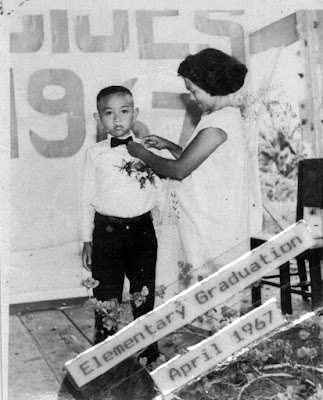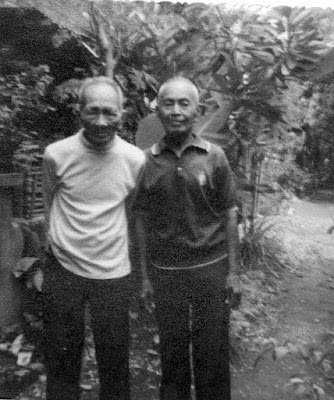Chapter 5 - Panta And Bondoy
Bondoy was reserved and would only say a word or two when talked to while Panta was gregarious and talked a lot. It did not take long for them to befriend most of the villagers including my parents who were very accommodating with strangers. Perpetua, on the other hand, was very shy and would not talk at all. When we invited her to play with us, she would run back to her parents and would not wander away again.
One time, I overheard my father telling a neighbor that Panta and Bondoy were living in the hinterlands about half day’s walking distance from our village. They had no neighbors. Our village was the nearest community that could be reached from their home. I surmised that since our village was the nearest that they could go to, Perpetua would have attended the same village school that we children were attending. And since we were of the same age, we would have been classmates in the third-grade class under Mrs. Ala-an. But I had not seen her in our school and that was how I realized that she was not attending school. My young mind was wondering whether she ever had been to school at all.
Their weekly visits were both time for socialization and for buying their household necessities for the week like kerosene, salt and sugar. Our village had three stores where we could buy our immediate house needs. Just like in many rural areas in the Philippines, these stores contain a little of almost anything, that’s why we call them “sari-sari store.” The three sari-sari stores in our village had no signboards and no names so we simply referred to them after their owners’ name. One was Panyang’s store, the second was Femia’s store and the third one was owned by an elderly lady named Colet.
We, villagers, do not really buy our groceries from the village stores. On Saturdays and Sundays, we usually go to the town proper of Cabadbaran to buy our supplies in bulk from larger stores at lower prices. And if you patronize a single store, its chinese owner would even give you more discounts and even extend credit. We only buy from the village store anything that we run out of during the week. Many a time while preparing our meals, my mother would request me to run to Panyang’s store to buy, say, a packet of edible oil or a bottle of soy sauce. That Panta and Bondoy would buy their groceries in the village stores and not in the town added one more oddity of their existence.
One day, while Panta was walking alone along a foot path, she encountered a stray, mad dog. Its eyes were fierce, its tail was between its hind legs, its tongue was sticking out, dripping with rabid saliva. Of course, this description is just my imagination because that is how a mad dog looks like. Any ordinary person would have fled for one’s life, but Panta was a brave woman who would not back out from a fight. She picked up a big enough stone and held her ground.
The crazed animal lunged at her and they struggled for a while. Eventually, she was able to strike the dog by the forehead with the stone she was holding. The dog fell to the ground, its body shuddering and blood was gushing out of its mouth. In a matter of minutes, the dog was dead. But Panta did not come out of that battle unscathed. Her forehead had sustained a big laceration inflicted by the sharp canine incisors.
That Sunday, when they arrived in our village, Panta’s wound on her forehead was still raw. The villagers were curious to know what happened and she told us the whole story. The villagers, especially the women, were worried. They advised Panta to go to the town to see a doctor. But we, rural folks, seldom go to see a doctor for we have an assemblage of herbal medications for every kind of illness. Panta dismissed their suggestions and assured everyone that she was fine.
By mid-afternoon, Panta became ill. She was so feverish that her closest friend in the village invited the trio to stay in her house for Panta to rest for a few hours until the fever subsided before they would start their trek toward their home in the mountains. But Panta’s fever never subsided, and her condition only grew worse and worse. The next day, Panta was delirious. Her mouth was dry, and she kept asking for water, but everytime she was given a cup of water, she was frightened to look at it and pushed the cup away. Her behavior was akin to a wild, wounded beast. She became so strong that it required three or four muscled men to subdue her.
Panta expired on the morning of the third day. Like a wedding, death in our village was a community affair. Everyone was involved. The men started fashioning a wooden coffin. The women congregated in the kitchen to cook and prepared meals. The young girls gathered flowers and arranged them. Embalming was not practiced so the dead had to be brought to the cemetery to be buried within 24 hours.
The cemetery was situated at the outskirts of the town of Cabadbaran some 8 kilometers away. Every burial was a long procession of villagers walking by foot toward the cemetery. The wooden coffin had to be borne on the shoulders of six to eight men who were rotated and replaced regularly by other waiting men all the way to the burial place.
The following Sunday, Bondoy and Perpetua returned to the village and went to see Colet. Later on we learned that Bondoy offered to sell Perpetua to Colet for 80 pesos but Colet turned him down. That was the last time, the villagers saw Bondoy and Perpetua. Wherever they went, nobody knew.
A few years later, after I completed my elementary education, our family moved to Bayugan a town some 50 kilometers away down south where my father bought a small farm. But I remained in Cabadbaran to pursue my secondary education in a school of my choice. I lived with my aunt and when out of school, I helped tend her store in the market.
Today, the Panta and Bondoy episode must just
be a blip in the collective memory of our village. They are just one of the
countless faces of people who existed in this world, crossed our paths at some
points in time and vanished without really leaving significant imprints in our lives. And if I wrote about them today, it is
because I would like to preserve bits and pieces of my childhood before age and
forgetfulness will overtake me.



ReplyDeleteNice story sir, daghan kaau nga panghitabo nga karon wala na kaau ni exists. Sa giingon pa sa akong ginikanan lisod kaau ang mga tao sauna, naa permi sa umahan para mabuhi, pero makasaludar ka sa mga tao sa una bisan simply ra ang kinabuhi apan nagmalipayon gihapon sila. Lahi ra karon nga high tech na, unya nagkaanam2 na gyud ug kahanaw ang mga estorya sa kaniadto. Maayo nga imo ning nashare sir, kay worth it ang pagbasa niini, malantaw gyud nimo unsa ang kinabuhi sa usa ka baryuhanon.👏👏👏Jhun Verano Labrador Jr., President, Calamba Elementary School Alumni Association.